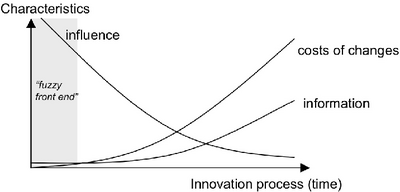Front-end Sustainability: Initiating the right sustainable projects
Developed by Kristine Fisker
Projects, programs and portfolios shape our society and world permanently, by shaping the impact of the products, buildings, infrastructure and systems designed within them. One of the most critical questions for project management going forward will be how to aid in tackling the large, complex, and interlinked sustainability challenges that need to be solved for societies worldwide to survive and prosper[1].
The 'Fuzzy' Front-End, when a project is conceptualized and defined, is the stage which is most critical in determining the impact of a project, yet the Front-End of Eco-Innovation has received little attention by the field of project management [2] [3]. This article will describe how project, program and portfolio managers can achieve effective sustainable impact and increase resilience and opportunity creation for their organizations by increasing sustainability focus in the fuzzy front end.
Contents |
Why implement a sustainability focus in the front-end?

The 'Fuzzy' Front-End is the most uncertain, challenging part of projects, while at the same time being the part of the project that has the largest influence on final project effectiveness (see Figure 1). "For companies to achieve true sustainability as opposed to a lower level of sustainability, considerations for sustainability have to be incorporated in early stages of the innovation process"[2].
"Sustainability managers spend much of their time correcting the impacts of todays’ products, services and business models. If companies redirected just 10% of their sustainability budget – beyond compliance, reporting, operations, supply chain, communications, etc – to fuzzy front-end innovation, they could effectively ‘design-out’ sustainability problems from their future portfolio AND align sustainability to an opportunity and growth agenda from the outset."
"The ability to ‘eco-innovate’ may become increasingly important under growing global pressures (see e.g., Royal Society, 2012), and may become a new source of competitive advantage. Hence, mastering the FEEI would be a key to business success and longevity. The tools required for this can perhaps be mastered more easily in big, resourceful companies, but larger companies may have difficulties in allowing the eco-innovation process to be open, informal and creative, aspects which contributed positively to the success of novel eco- innovations." ([2])
As sustainability is a new lense to view projects through, it requires rethinking... Move from reactive to pro-active.
Management of meaningful sustainability projects, programs and portfolios can be especially complex, as the scope is beyond what a single organization, government or individual can solve alone. How to tackle this, will be described below, informed by a review of literature on the topic and structured with an offset in the advice in the article 'The fuzzy front-end of sustainability' by Chris Sherwin [3].
How to do it
0. Unfuzz the fuzzy front-end
The foundation of initiating the right sustainable projects, is to recognize that the fuzzy front-end is often under-managed in organizations , but can in fact be managed, and then to start giving it the attention and ressources it is due. Because the fuzzy front-end is a highly insecure and thus cognitively uncomfortable stage, there is a tendency to go with a pre-concieved idea of the. [5] [6] Cite error: Closing </ref> missing for <ref> tag.
Open Innovation: Going beyond the individual organization
"Individual organizations must be part of the solution, but they cannot be addressed within the organization alone or solved independently in other organizations." "The key to solving complex, systemic, long-term problems across sectors and levels is to address them together." [7]
The Sustainable Innovation Early Phase Model
Tool [8]
References
- ↑ Konstantinou, Efrosyni, Jenny McArthur, Rob Leslie-Carter, and Vedran Zerjav, 2021. Climate Change and the Evolution of the Project Management Profession, Project Management Institute. (https://www.projectmanagement.com/contentPages/video.cfm?ID=736527&thisPageURL=/videos/736527/climate-change-and-the-evolution-of-the-project-management-profession#_=_)
- ↑ 2.0 2.1 2.2 Bocken, N. M. P., M. Farracho, R. Bosworth, and R. Kemp, 2014. The Front-End of Eco-Innovation for Eco-Innovative Small and Medium Sized Companies, Journal of Engineering and Technology Management 31:43–57. Available at: https://www.repository.cam.ac.uk/bitstream/handle/1810/245338/The-front-end-of-eco-innovation_final__open-access.pdf?sequence=1 )
- ↑ 3.0 3.1 Sherwin, Chris, 2017. The Fuzzy Front-End of Sustainability, Edie. (https://www.edie.net/the-fuzzy-front-end-of-sustainability/) )
- ↑ Figueiredo, João, N. Correia, I. Ruivo, and J. L. Alves. 2015. “A Cross-Functional Approach for the Fuzzy Front End: Highlights From a Conceptual Project.” in International Conference on Engineering Design ICED15. Milan, Italy. (https://www.semanticscholar.org/paper/A-CROSS-FUNCTIONAL-APPROACH-FOR-THE-FUZZY-FRONT-A-Figueiredo-Correia/717996dc452bfc56468287064373c468d8de282b)
- ↑ Morris, Peter W. G. 2017. Climate Change and What the Project Management Profession Should Be Doing about It - a UK Perspective. APM, UCL.
- ↑ Olsson, Nils O. E., and Knut Samset. 2006. “Front-End Project Management, Flexibility, and Project Success.” in PMI® Research Conference: New Directions in Project Management, Montréal, Québec, Canada. Newtown Square, PA: Project Management Institute.
- ↑ Cite error: Invalid
<ref>tag; no text was provided for refs namedBason2023 - ↑ Stock, Tim, Michael Obenaus, Amara Slaymaker, and Günther Seliger, 2017. A Model for the Development of Sustainable Innovations for the Early Phase of the Innovation Process, Procedia Manufacturing 8:215–22. Available at: https://www.sciencedirect.com/science/article/pii/S2351978917300331?via%3Dihub